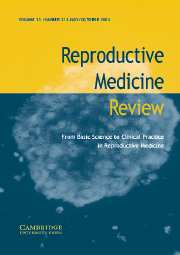No CrossRef data available.
Article contents
Uterine gene therapy and implantation
Published online by Cambridge University Press: 01 March 2000
Abstract
The endometrium undergoes cyclical changes under the influence of ovarian steroids, resulting in a tissue receptive to embryo implantation. These changes involve complex interactions between stromal cells, overlying epithelium, blood vessels and the embryo itself. For many women endometrial dysfunction is the source of considerable ill health, causing menstrual problems, pain and infertility. As the use of fertility control has become more widespread across the world, regular menstruation is the norm and abnormalities of menstruation have increased in consequence. Hormone treatments have had limited success in treating these longstanding problems, and new approaches to modulating endometrial functions such as menstruation and implantation (including contraceptives) are needed.
- Type
- Research Article
- Information
- Copyright
- © 2000 Cambridge University Press




